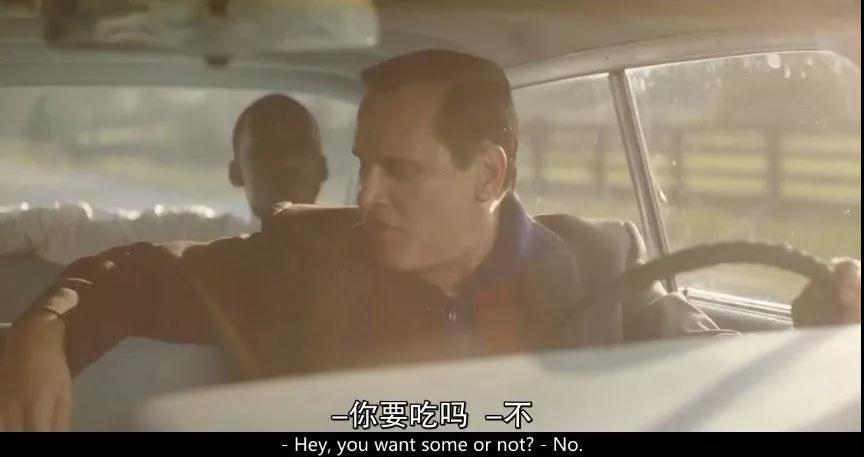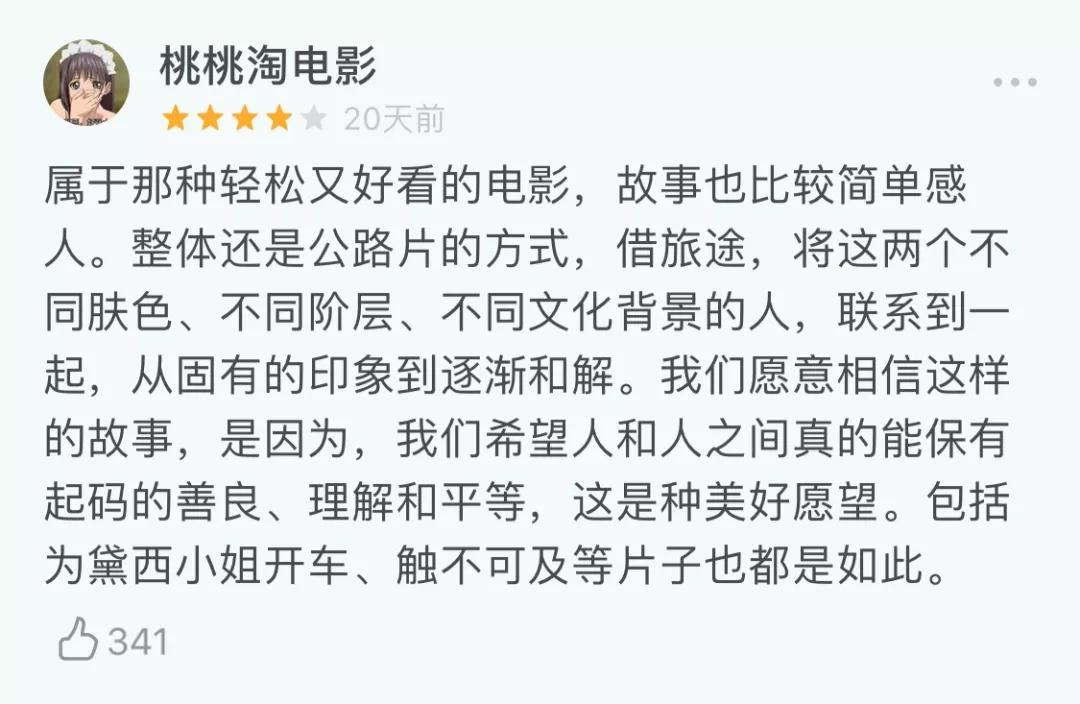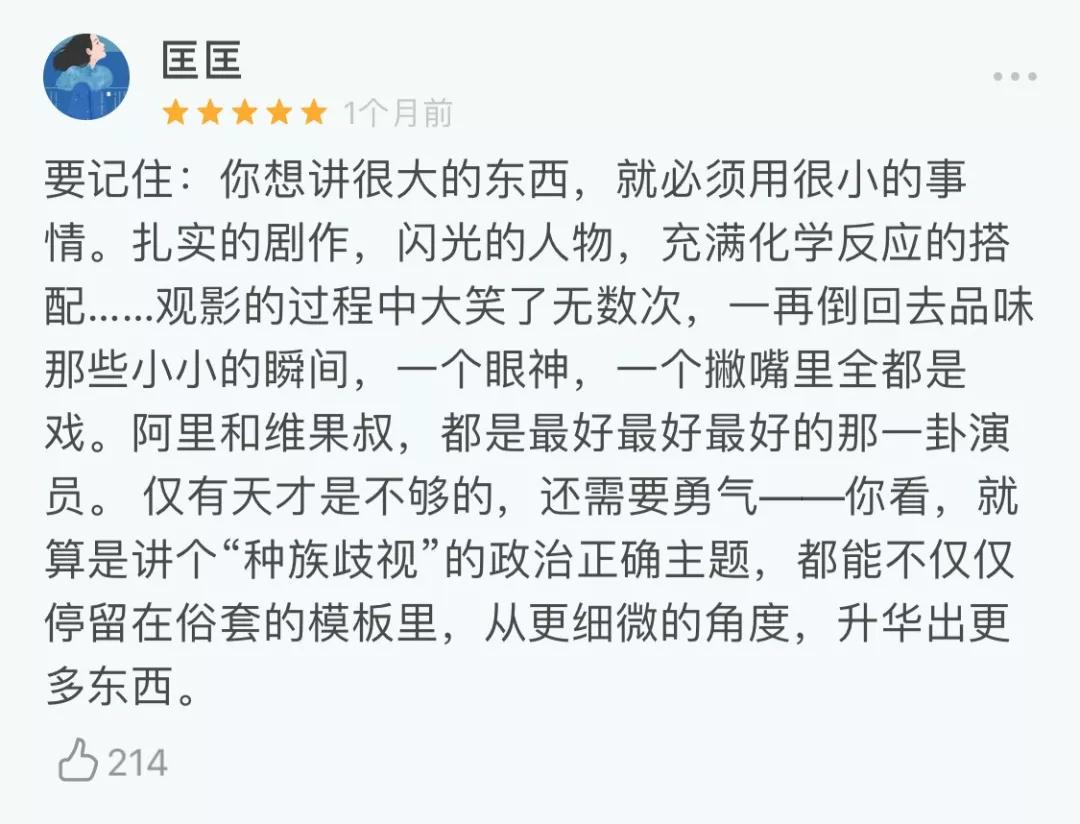最近,今年奥斯卡大热的电影《绿皮书》成为双语君(微信ID:Chinadaily_Mobile)的朋友圈高频词。

从“卖相”上看来,《绿皮书》算是小众文艺片那一类,没有中国观众熟悉的好莱坞明星,也没有炫目的特效,故事表达的主题也略显老套。
这或许也是之前的奥斯卡影片在中国往往表现不佳的原因。
然而《绿皮书》却是个例外。豆瓣评分8.9、《泰坦尼克号》之后最叫座的奥斯卡获奖影片……外媒都被它在中国的表现惊呆了。

《好莱坞报道》:为什么中国人像喜欢大片一样热衷于《绿皮书》
据石英网3月9日报道:
On the social network and movie review platform Douban the movie has a rating of 8.9/10, outperforming 98% of comedies and 97% of dramas.
在中国社交和电影评论平台豆瓣上,《绿皮书》斩获了8.9分的高分,高于98%的喜剧类和97%的剧情类。
The film has taken in more than $30 million since it opened, making it the highest-earning best-picture winner in China after Titanic. In the past many Oscar best-picture films have been viewed as niche, and haven’t done very well.
从上映起,《绿皮书》在中国吸金3000万美元,成为在《泰坦尼克号》之后最叫座的奥斯卡获奖影片。过去的奥斯卡影片都被看作不接地气的阳春白雪,表现不佳。
niche n.小众市场

票房最好的去年奥斯卡最佳影片《水形物语》票房也仅有1.05亿元
上个周末,双语君(微信ID:Chinadaily_Mobile)特意去电影院把这部大热的电影看了。
其中,有一幕似乎让观众笑得特别开心。(剧透预警了啊)





“You people love fried chicken,” says a white chauffeur to the black man in the back seat, offering him a drumstick.
“你们黑人都喜欢炸鸡的,”白人司机对后座黑人乘客说着,递给他一个琵琶腿。
chauffeur ['ʃəʊfə; ʃəʊ'fɜː]司机
“You have a very narrow assessment of me,” the passenger responds, refusing to take it. After a short argument, he begins to gingerly nibble on the chicken, then polishes it off, and even flings the bone out the window, in imitation of his carefree driver.
“你对我的认识非常狭隘啊,”乘客说,没接那个琵琶腿。在争论片刻之后,黑人乘客小心翼翼地啃起了鸡腿,接着啃完了整只,甚至还学着司机,把骨头扔到了窗外。

看到这个镜头,电影院不少观众都笑翻了。
石英网记者在中国观看这部影片时,也发现了中国观众对这一幕的特别喜爱,并且写下了《为什么中国观众会喜欢<绿皮书>》("Why Audiences in China Are Loving Green Book?")一文。

为什么中国观众喜欢《绿皮书》?
作者在广州看这部电影时,演到炸鸡这一幕,整个影院爆发欢笑(burst into delighted laughter)。
这一幕在中国社交媒体上也颇有热度:
In China that moment was widely discussed on the social media platform Weibo as one of the film’s best scenes. A lot of the chatter is just jokes from Chinese users saying they would love to have a KFC Family Bucket.
但在中国,这一幕在微博上却成为了最具热度的一幕。很多用户都开玩笑说,看完《绿皮书》就想吃个肯德基全家桶。
截至3月11日下午,微博上#看完绿皮书就想吃炸鸡#话题的阅读已经达到3.7亿,讨论6.2万条。

当然,如果说这一幕在中国受到欢迎的原因只是因为大家想吃炸鸡,那未免也太不公平。
不少中国观众喜欢这一幕,是因为这一个细节传递人物性格,也体现出人与人之间跨越了种族的一种温情:
But many also felt connected to Shirley’s complex character—"the doctor who uses indifference to cover the inner loneliness," as one Douban reviewer describes him.
但很多人也因这一幕感受到了谢利博士复杂的人物性格——“这位博士用冷漠来掩盖了他内心的孤独,”一位豆瓣网友评论说。
从喜剧的角度来讲,这一场景里戏剧冲突形成的“反差萌”效果也着实符合中国观众的胃口。

石英网援引影评人韩浩月的评论说,影片的笑点设定比较符合中国观众对喜剧片的认知和要求:
比如片中是白人给黑人当司机,就与一般人心目中黑人应该为白人服务的印象调了个个儿,这种由戏剧冲突造成的喜剧性,让人想起开心麻花的模式。影片还大量运用反转手法,营造出很多意料之外的笑点,国内观众也很吃这一套。

不过,这位外媒记者可能不太了解中国“网梗”,因此也忽视了这一幕走红的原因。且看这条高赞豆瓣评论……


对,就是王境泽没错了。
但让作者想不通过的是,在美国,颇受中国观众欢迎的炸鸡这一幕成为了批评者们攻击的对象。
在《赫芬顿邮报》中两个影评人的探讨中,有着如下的对话:
Matt Jacobs: The movie that would have felt at home 20 years ago, the ideas it’s proffering, aren’t any more thoughtful or progressive. I mean, in “Green Book,” a white man teaches a black man how to eat fried chicken, for chrissakes. What can we even make of that scene?
马特·雅各布斯:如果是20年前的话,这部电影可能会比较合时宜。它所传递的价值观并没有更深刻或者更进步了。在《绿皮书》里,一个白人教一个黑人怎么吃炸鸡,我的老天鹅,这到底是想表达什么呢?
Zeba Blay: That scene in particular epitomizes a lot of what’s off about this movie. I didn’t think there was anything inherently offensive about the scene, but, boy, was it self-aware. Like, I see what you’re doing, movie, and you see that I see what you’re doing, and you’re feeling pretty clever and patting yourself on the back when, in actuality, you’re not doing/saying anything that interesting or provocative at all.
泽巴·布莱:这个桥段是这部电影不对劲的典型代表了。其实这个场景本身而言并没有什么冒犯,但他们太把这一幕当回事了。我知道这是电影,这一点你也心知肚明,你对这一幕特别引以为豪,但实际上这并没有什么有趣的,也很平常。
由于文化差异带来的审美异同还不止于此。
虽然有着新晋奥斯卡最佳影片的光环,但这部电影在美国仍然受到了一些美国影评人和观众的批评。
还有一些评论认为,这部电影表面平权,但却以白人的视角、表现的是白人的自我救赎。这一点也有一些中国网友深以为然:
Some people in China saw the film in much the same way as its critics in the US: “Really quite a white-male perspective,” said one Douban reviewer. “This piece is very traditional—no wonder it won the Oscar.”
一些中国观众和美国影评人的观点一致:“真的是非常白人男性视角,”一位豆瓣网友说。“这是在是很经典的视角——难怪它能获奥斯卡奖。”

还有一些美国人觉得,电影这种轻快的调调并不能反应这段历史真实的沉重感(fails to capture the true intensity of that history)。
但作者却觉得,正是因为影片有这种“笑着讲故事”的特质,才使之打破文化壁垒,成功打动地球另一端的观众:
I began to wonder if the very qualities that made the film controversial in the US have been key to helping it connect with people on the other side of the world. As the critics point out, it’s a feel-good movie—well-paced, funny at times, and touching as the characters open their hearts to each other.
我开始觉得,这个在美国备受争议的特质,会不会正是电影在世界的另一端获得成功的原因。就像是影评人指出的,这部电影节奏适当、笑料不断,当主人公对彼此坦诚相待,又戳人泪点。
轻松的叙事诠释沉重的主题,正是这部影片吸引读者的原因之一,“不是所有沉重都要用沉重去表现”。


影片中的一些细节也颇为容易让中国观众产生共鸣,比如谢利让弗拉朗格放回偷拿的玉石,后来明明知道他假意放回也为了保住他的颜面没有揭发他;谢利帮弗拉朗格写信给妻子等等:
Shirley helps Vallelonga write letters to his wife, including correcting his spellings and polishing his metaphors, which resonated with the audience, since the effort to delicately express love is valued in Chinese culture too.
谢利帮助弗拉朗格给妻子写信,帮他遣词造句、修改拼写这部分也和观众产生了共鸣,因为中国文化也非常注重微妙地表达爱意。

或许正像是作者所说:
The movie’s approach may have been excessively light for people closer to that history, but for a more distant audience, it seems to have been the right touch.
对于和历史更近的人群来讲,影片的调调或许太过轻快了。但是离这段历史比较远的观众来说,这样的表达不多不少刚刚好。
编辑:李雪晴
参考:好莱坞报道 石英网 豆瓣